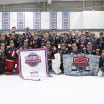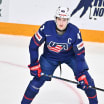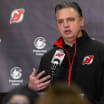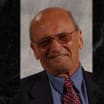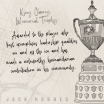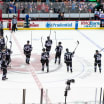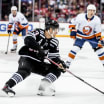Ever since the 1972 Summit Series between the Soviet Union's stars and the best the National Hockey League had to offer, North American hockey people began focusing more and more on Russian stickhandlers.
"We knew the Soviet players were real good," said New Jersey Devils owner Dr. John McMullen, "what we didn't know was how to get them out of Russia to play in the NHL."
The Iron Curtain, separating the Soviet Union from the Free World, still was thick when McMullen bought his hockey club in 1982. But as a world-travelling businessman, Doc Mac knew more than most about machinations in Russia.
In 1983 -- a year after he moved his franchise to the Meadowlands -- McMullen summoned his general staff to a high-level top secret meeting. The subject: to sign a Russian player or two and be the NHL's first to do so.
DEVILS OVER THE DECADES: Ch. 28 - The Russian Invasion of New Jersey
Stan Fischler writes about the diplomatic process and waiting game to bring Russian players to the Devils and NHL
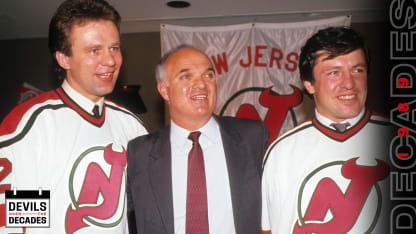
PREVIOUS ARTICLES
PAST CHAPTERS
Ch. 1 - The Birth of Hockey in Jersey
Ch. 2 - How it all Began
Ch. 3 - The First Devils Roster
Ch. 4 - The Milestone First Season
Ch. 5 - The Great Gretzky Uproar
Ch. 6 - Getting Even with Gretzky
Ch. 7 - A New Coach, A New Era
Ch. 8 - The Birth of a Rivalry
Ch. 9 - A Showdown Season
Ch. 10 - Carpenter's Last Stand
Ch. 11 - Enter Lou, Enter Changes
Ch. 12 - Exit Carpenter, Enter Schoenfeld
Ch. 13 - Devils Over the Decades
Ch. 14 - The Hot Homestretch
Ch. 15 - Showdown with the Rangers
Ch. 16 - A Classic Win
Ch. 17 - Playoff Bound - Almost!
Ch. 18 - First Playoff Berth
Ch. 19 - First Playoff Win
Ch. 20 - Washing the Capitals
Ch. 21 - Meadowlands Melodrama
Ch. 22 - Goodbye Caps, Hello Boston
Ch. 23 - Taking on the Bruins
Ch. 24 - Yellow Sunday in East Rutherford
Ch. 25 - Close but no Cigar
Ch. 26 - Best Devils Quotations
Ch. 27 - Build-Up to a Letdown
Ch. 28 - The Russian Invasion of New Jersey
Ch. 29 - Slava and Sergei Arrive
Ch. 30 - Evolution of the Russians
Ch. 31 - 1990s Playoffs or Bust
Ch. 32 - Adding Muscle on top of Muscle
Ch. 33 - Coaching Change; Cunnif to McVie
Ch. 34 - McVie for Victory
Ch. 35 - Bring on the Penguins
Ch. 36 - Chasing the Elusive Penguins
Ch. 37 - Building a Champion - Get Stevens!
Ch. 38 - Explosive Devils of 1991-92
Ch. 39 - Breezing Along with the Breeze
STANLEY CUP WINS
2003 - Devils Stanley Cup Run
2000 - Lucky Seven
2000 - Winning in Dallas
1995 - Built off a Lockout, Cup Champs
SPECIAL EDITIONS
Devils Cavalcade of Coaches
Coaches Sidebar
Best Devils Quotations
WHAT'S NEXT
A new Devils Over the Decades article will be published every Tuesday, Friday and Sunday morning. Check NewJerseyDevils.com to continue reading!
The good doctor's reach exceeded his grasp but he was adamant about giving the Russian plan a try. He had studied the European landscape and could see some possibilities, long-shots though they may have been.
McMullen: "My feeling was that changes in the European political situation could come about and bring an easing of relations between East and West. If that happened, we might be able to lure a couple of players to the Devils."
All hands agreed that it would be worth a try; the sooner the better. Specifically the June 1983 Entry Draft which already was causing a commotion in league corridors.
Igniting the big fuss was conjecture over who would be the top Draft pick since such future Hall of Famers as Pat LaFontaine and Steve Yzerman would be available.
Then came the stunner when Minnesota, picking first, opted for a Rhode Island star high school forward named Brian Lawton. To put it mildly, this was the shocker of all Draft shockers.
Which helps explain why there hardly was a murmur one way or the other when New Jersey announced in the eighth round that the Devils choice was a defenseman named Viacheslav (Slava) Fetisov; a full-fledged Russian.
And since nobody reacted to the Fetisov selection -- 150th overall -- nothing but yawns were offered when the Devils announced at the 213th rung that they were latching on to another Russian defenseman, Alexei Kasatonov.
In all fairness, the Garden Staters did cause a bit of a stir with their sixth overall pick, winger John MacLean. For goaltending insurance Providence College whiz kid, Chris Terreri, was added to the future roster.
"It was still early in our chase after the Russians," McMullen acknowledged, "and I told my people that they had to be patient in our pursuit. At the time, Fetisov and Kasatonov had more important things to do than play for us."
That they did.
Winning as many international awards as possible was at the top of the Soviet hockey agenda. Each in his playing prime, Slava and Alexei were key components in the Russian hockey machine; no way they'd leave.
Or was there?
While the rest of the Devils high command focused on the NHL, Doc Mac maintained his relentless focus on Russian affairs. He knew he was on the right track when the more liberal Mikhail Gorbachev became Soviet leader.
This was a break for Doc Mac who still primarily focused on his improving franchise.
McMullen could smile over his hotshot playoff team in 1988 but he also had grins when the suddenly more friendly Soviet Union was uttering convivial terms such as glasnost and peristroika.
During the 1988 Winter Olympics at Calgary, McMullen's new generalissimo, Lou Lamoriello was a spectator. Most of the hockey media figured that Larrupin' Lou was there to insure that Canadian goalie Sean Burke had the NHL gcods.
What eluded the newsmen was that the secretive Lamoriello was on a spying mission beyond Burke; Lou was homing in on Fetisov and Kasatonov. That done, Lamoriello laid out a blueprint for eventually nabbing the pair.
Part One was yet another secret Mission to Moscow conducted by the g.m. It was a different kind of scouting expedition than Lou was accustomed to but he became a birddog nevertheless.
But for Lou and the Devils there was a monstrous obstacle. Even assuming that Lou could persuade Fetisov to emigrate to East Rutherford there was the matter of getting permission from the leader of Soviet hockey, Viktor Tikhonov.
And anyone who knew Comrade Tikhonov understood that there was no way in either Russian, Canadian or Bergen County Heaven that victorious Viktor would allow his two best backliners to leave his grasp. Not a chance.
Nonplussed, Lou picked his way through the icy brambles and went to Plan B.
Lamoriello: "I had no illusions that this would be an easy thing to accomplish. But I had a favorite expression that fit this situation; 'You have to take the first step if you're going to walk the mile.'"
Lou knew that it wasn't just Tikhinov standing in his way. There was the matter of the Soviet Ice Hockey Federation; not to mention the Russian Army. As it happened, Slava was a major in the Soviet armed forces.
The 1988-89 season came and went without any Russian donning a Devils uniform but by this time the Metropolitan Area media had seen enough smoke and realized there now was fire in Lamoriello's eyes. He was near his quarry.
Then, Lady Luck entered from Stage Left and did New Jersey a big favor. Fetisov's home club, Central Red Army agreed to play an exhibition game against the Devils in East Rutherford.
By this time McMullen and Lamoriello had made enough social contacts to fill a phone book. One of them happened to be the Soviet Ambassador to the United States, Yuri Dubinin, who was invited to drop the game's ceremonial first puck.
Conveniently. Lou also sent an opening face-off invite to U.S. Deputy Secretary of State John Whitehead and the latter's pal, none other than Dr. McMullen. The trio became so lovey-dovey that Dubinin agreed to do his new pals a favor.
The Soviet Ambassador hustled over to Slava and asked if one day he'd like to play for the Devils. When Dubinin nearly was blown over by Fetisov;s "Da," as in "Yes," the wheels moved from local to express.
Speeding the process was Devils captain Kirk Muller who personally welcomed the Russian defenseman to Byrne Arena. "I hope," Muller intoned, "that one of these days Slave and I will be teammates."
Fetisov glowed in appreciation although he knew that, despite the aura of positive expectations, no deal had been done. That said, all parties quietly agreed that with a few more scissor-cutting of red tape, that it could happen.
But when?
The curtain came down on the 1988-89 season and now all eyes were on the June Draft. Most significantly, a spate more of Russians were picked, among them Pavel Bure and Sergei Fedorov.
Russian-born Mark Gandler, now a player agent in the Met Area was among the first to realize that a revolutionary hockey move was in the works and the Devils were plumb in the middle of it.
"Keep your eyes open after the Draft," Gandler whispered, "because something big's going to happen."
The agent was right; In a matter of a month the media would be summoned to Byrne Arena's Winners Club for what would be known as "The Russian Revolution in New Jersey."
Doc Mac and Larrupin' Lou were about to make history!
LISTS: FOUR WAYS IN WHICH THE DEVILS WERE ABLE TO LAND RUSSIANS:
1. THE MCMULLEN PLAN: Long before other hockey, owners would get on the Russian bandwagon, the Devils owner launched his Moscow Expeditionary Force in 1983, a year after he secured the franchise.
2. LAMORIELLO DETERMINATION: Unimpressed by the odds against him, Larrupin' Lou patiently waded through the Soviet bureaucratic morass and diligently cut all the red tape before finally securing his bounty.
3. FETISOV'S DETERMINATION: Slava had won all the Gold Medals as a Soviet player and now he wanted a chance to garner a Stanley Cup. Signing with the Devils would be a step in that direction.
4. TIMING: The Cold War, as we once knew it from the 1960s and onward, was slowly thawing out. The more the freeze melted, the better the Devils chances. Once Ambassador Dubinin moved in, the quarry was all but snared.
(NEXT WEEK: CHAPTER 28, A ROYAL WELCOME IN EAST RUTHERFORD FOR RUSSIAN ROYALTY.)

